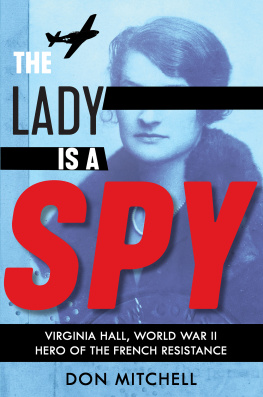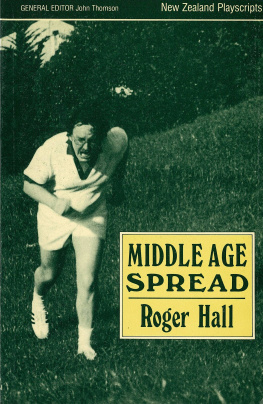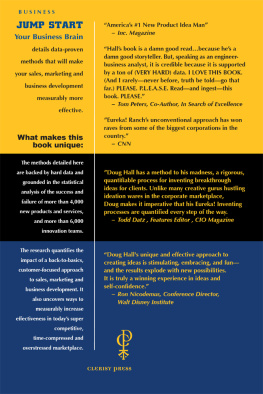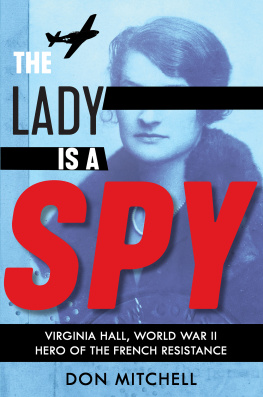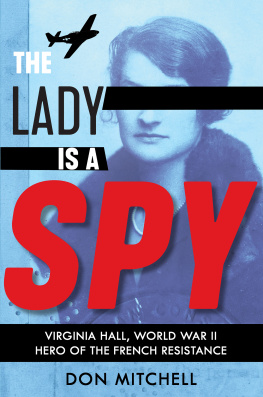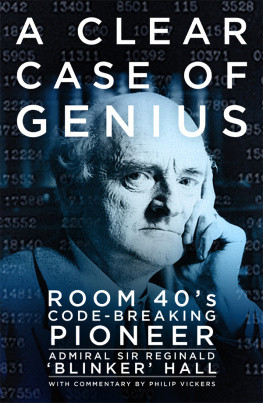youre
stepping
on my
cloak and dagger
Dedicated
To Whom it May Concern
youre
stepping
on my
cloak and dagger
ROGER HALL

NAVAL INSTITUTE PRESS
ANNAPOLIS, MARYLAND
Naval Institute Press
291 Wood Road
Annapolis, MD 21402
1957 by Roger Hall
All rights reserved. No part of this book may be reproduced or utilized in any form or by any means, electronic or mechanical, including photocopying and recording, or by any information storage and retrieval system, without permission in writing from the publisher.
First Bluejacket Books printing, 2004
ISBN 13: 978-1-61251-371-3
Library of Congress Cataloging-in-Publication Data
Hall, Roger, 1919
Youre stepping on my cloak and dagger / Roger Hall.
p. cm. (Bluejacket books)
Originally published: New York: Norton, 1957.
1. Hall, Roger, 1919 2. United States. Office of Strategic ServicesBiography. 3. World War, 19391945Personal narratives, American. 4. World War, 19391945Military intelligenceUnited States. 5. Intelligence officersUnited StatesBiography. I. Title.
II. Series.
D810.S7H3 2004
940.548673092dc22
[B]
2003044276
15 14 13 12 11 10 09 08 15 14 13 12 11 10 9
contents
Other books by Roger Hall:
All My Pretty One
19: A Story
The latest edition of this book has been brought to publication with the generous assistance of Marguerite and Gerry Lenfest.
Roger Halls Youre Stepping on My Cloak and Dagger first appeared in 1957, and literary reviews hailed the author as one wry spy. The book, about Halls uncommon experiences in World War II espionage, particularly captured the imagination of young readers. Cloak and Dagger finds Hall a real man of nervein both senses of the wordas he battles the enemy but more often his superiors.
Although considered a cult classic in intelligence circles, the book went out of print. Recently I discovered Halls book, a lost gem of irresistible charm and irreverence. A sentence rarely passed without a punch line. I met with Hall and told him that many people admitted his book was the only one they had ever stolen from the library. That cheered him for hours. He had previously heard that young Central Intelligence Agency recruits were warned, book held high, We dont want this to ever happen again. Hall loves that story and anything else that seems to confound convention. His favorite tale of wartime spying occurred in Nazi-occupied France. A colleague in the Office of Strategic Services, the wartime precursor to the CIA, had been asked to destroy a German tank sitting at a key crossroads. No one in the French Resistance could get close enough. Dressed like a French peasant and fluent in German, the OSS man approached the tank and yelled, Mail! When the tank lid opened, he tossed in two grenades. Mission accomplished.
OSS founder William Wild Bill Donovan had sought just such glorious amateurs for clandestine work. He was interested less in formal military expertise than in recruiting agents who could use their wits and find innovative ways, in sticky situations, to win the war. The OSS seemed an ideal match for Roger Wolcott Hall, who joked that he otherwise was destined for execution by firing squad in the regular Army.
The son of a Navy captain, Hall grew up in Annapolis with a hearty streak of patriotism but little awe of authority. To him, Admirals Chester W. Nimitz and William F. Halsey Jr. were Uncle Chet and Uncle Bill. With Americas entry into the war, Hall was drafted into the Army, and after going to Officer Candidate School, he became an instructor in Louisiana. An unfortunate combination of the heat, the alligators, and his natural audacity led to a series of disagreeable episodes. Enter the unsuspecting OSS.
As part of his training, Hall infiltrated a Philadelphia circuit-breaker plant by pretending to be a wounded war hero in search of work. He so impressed the firms vice president that he not only got the job and a date with the mans daughter, but also was asked to speak at the companys war bond rally. His rousing oratory, which surprised even him, was published in a local paper. His superiors told him there was such a thing as a job too well done.
Eventually sent to England, he became an instructor again. He pleaded for commando work, but the inefficient bureaucracy worked against him. Excited about dropping into occupied France, he underwent exacting preparation and made a perfect parachute jump behind the lines. Unfortunately, they were the Allied lines. So it was back to training, next working with a group of purportedly reformed Nazis nicknamed Matthew, Mark, Simon, John, Luke, James, and Happy.
For all his misadventures, Hall wound up thriving in an organization that admired craftiness, wit, and, ultimately, confidence. When he finally arrived in a war zone, the little-known but strategic Norwegian theater of operations, he came through with flair. Operation Better-Late-Than-Never, as he dubbed it, was a success.
Hall went on to write two novels, spent years as a freelance writer and editor, and had a stinthis favorite jobas cartoon editor for the old True magazine in New York. He now lives with his wife, Linda, in a Victorian-style house in Delawares Brandywine Valley. He keeps a stash of ideas in an upstairs trunk. One is for a book called Bayonet the Survivors and Other Love Poems. Until Hall writes the poems, readers should be delighted to have Youre Stepping on My Cloak and Dagger uncloaked after all these years.
Adam Bernstein
Metropolitan Staff
The Washington Post
MY ORDERS were concise, with hygienic overtones:
Report to the O.S.S. Wash.
With the inspiring words of the Commanding Officer at Camp Plauche, LouisianaNever mind what I told you to do, you do what I tell you to do!still ringing in my ears, I flew to our nations capital, found the proper building by a process of elimination in which the Bureau of Indian Affairs was runner-up, and presented my orders to a major who seemed supremely bored by it all.
He didnt bother to look up or return my salute. When I started to lean on the desk and read over his shoulder he frowned, put down the magazine, reached for my papers, and came to life in a hurry. They were Special Orders, signed in ink by one George C. Marshall, Chief of Staff.
Suddenly I had found a friend. How was your trip, Lieutenant Hall? Nice to have you with us. I think youd better discuss these orders with Colonel Guyon.
He led me to him personally, handling me en route like a paper cup filled with acid. I began to wonder the minute we walked into the Colonels office; it must have been the way he shook his head.
So youre going over to the Office of Strategic Services, son? This in a tone of voice generally used when the parish priest comes slowly into the death cell. Before I could answer, he asked, Are you married, son?
No, sir, said I, smartly.
None of them are, said the Colonel, mournfully.
None of whom arent what, sir? I asked, not so smartly.
None of the young officers who go over to the O.S.S. are married. These glad tidings came from the Major. Colonel Guyon shook his head again.
No, they are all young, unmarried, junior officers. He made that combination of eight words sound like a pronouncement of doom. The conversation was terrifying me. I did what I could.
Sir, Im engaged.
That doesnt count, son. Did you volunteer for this assignment? He sounded as though he were trying to give me an out.




